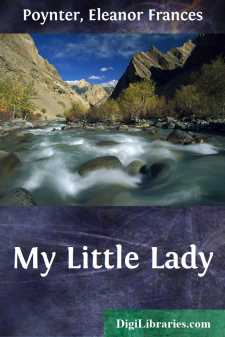Categories
- Antiques & Collectibles 13
- Architecture 36
- Art 48
- Bibles 22
- Biography & Autobiography 813
- Body, Mind & Spirit 142
- Business & Economics 28
- Children's Books 15
- Children's Fiction 12
- Computers 4
- Cooking 94
- Crafts & Hobbies 4
- Drama 346
- Education 46
- Family & Relationships 57
- Fiction 11829
- Games 19
- Gardening 17
- Health & Fitness 34
- History 1377
- House & Home 1
- Humor 147
- Juvenile Fiction 1873
- Juvenile Nonfiction 202
- Language Arts & Disciplines 88
- Law 16
- Literary Collections 686
- Literary Criticism 179
- Mathematics 13
- Medical 41
- Music 40
- Nature 179
- Non-Classifiable 1768
- Performing Arts 7
- Periodicals 1453
- Philosophy 64
- Photography 2
- Poetry 896
- Political Science 203
- Psychology 42
- Reference 154
- Religion 513
- Science 126
- Self-Help 84
- Social Science 81
- Sports & Recreation 34
- Study Aids 3
- Technology & Engineering 59
- Transportation 23
- Travel 463
- True Crime 29
My Little Lady
Description:
Excerpt
CHAPTER I.
In the Garden.
There are certain days in the lives of each one of us, which come in their due course without special warning, to which we look forward with no anticipations of peculiar joy or sorrow, from which beforehand we neither demand nor expect more than the ordinary portion of good and evil, and which yet through some occurrence—unconsidered perhaps at the moment, but gaining in significance with years and connecting events—are destined to live apart in our memories to the end of our existence. Such a day in Horace Graham's life was a certain hot Sunday in August, that he spent at the big hotel at Chaudfontaine.
Every traveller along the great high road leading from Brussels to Cologne knows Chaudfontaine, the little village distant about six miles from Liége, with its church, its big hotel, and its scattered cottages, partly forges, partly restaurants, which shine white against a dark green background of wooded hills, and gleam reflected in the clear tranquil stream by which they stand. On every side the hills seem to fold over and enclose the quiet green valley; the stream winds and turns, the long poplar-bordered road follows its course; amongst the hills are more valleys, more streams, woods, forests, sheltered nooks, tall grey limestone rocks, spaces of cornfields, and bright meadows. Everyone admires the charming scenery as the train speeds across it, through one tunnel after another; but there are few amongst our countrymen who care to give it more than a passing glance of admiration, or to tarry in the quiet little village even for an hour, in their great annual rush to Spa, or the Rhine, or Switzerland. As a rule one seldom meets Englishmen at Chaudfontaine, and it was quite by chance that Horace Graham found himself there. An accident to a goods train had caused a detention of several hours all along the line, as he was travelling to Brussels, and it was by the advice of a Belgian fellow-passenger that he had stopped at Chaudfontaine, instead of going on to Liége, as he had at first proposed doing, on hearing from the guard that it was the furthest point that could be reached that night.
Behind the hotel lies a sunshiny shady garden, with benches and tables set under the trees near the house, and beyond, an unkempt lawn, a sort of wilderness of grass and shrubs and trees, with clumps of dark and light foliage against the more uniform green of the surrounding hills, and it was still cool and pleasant when Graham wandered into it after breakfast on that Sunday morning, whilst all in front of the hotel was already basking in the hot sunshine. He had gone to bed the night before with the fixed intention of leaving by the earliest morning train, for his first impressions of Chaudfontaine had not been cheerful ones. It was nearly midnight when, with his companions, he had crossed the bridge that connects the railway station with the hotel on the opposite side of the stream, and scarcely a light was shining from the windows of the dim white building before him; he was very tired, rather cross, and disposed to grumble at the delay in his journey; and the general aspect of things—the bad supper, the sleepy waiter carrying a candle up flights of broad shallow wooden stairs, and down a long passage to a remote room barely furnished, the uncertain view of a foreground of rustling poplars, and close behind them a black silent mass of hill—all these had not tended to encourage him....


